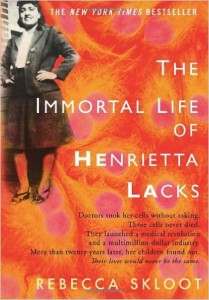


I believe it was Rebecca's tenacity and generosity, mixed with her genuine interest in the person of Henrietta Lacks, that allowed her to befriend the Lacks family. Why do you think Rebecca Skloot was able to get close to the Lacks family when so many others could not? However, I do think that the donor should receive a small portion of the royalties from the sale of these cell lines. The donor does not lose anything by having their tissues used for experimentation after they have already been removed. It is the researcher who must perform the necessary techniques to establish and develop the cell line, not to mention the work of stabilizing and marking them. I believe that the researcher who patented them should own the cell lines. Do you think that the patient who donated the tissue should retain ownership of the cell line, or should they pass to the ownership of the researcher who patented them? One of the central controversies of the book is about the ownership of cell lines. Still, I think that the best hope any of us have for immortality is to remain living in the memories of our friends and family, so I understand why these things are called immortality. Henrietta herself cannot continue to learn and change and grow, though her cells and her memory still live on. I think that immortality requires an unchanging sense of self, so neither of these things qualifies as immortality. Do you think either of these constitutes immortality? What's necessary in order for someone to be immortal? The book makes frequent reference to Henrietta's "immortality," derived from both the continual use of her undying cells in scientific research and her significance in the lives of her surviving relatives. Lastly, the fear of doctors so prevalent in the Black community may have made Henrietta delay her medical treatment. She might also have received better treatment if she were white, and certainly her doctors would have been less likely to take tissue samples from her without her consent. Moreover, Henrietta's race was connected with her family's tenuous economic and social position they did not have a great deal of money or prestige, and so she did not have access to second opinions or options for care. Most significantly, Henrietta would not have developed cervical cancer if she were not born with a cervix. How did Henrietta’s race and gender impact her life?


 0 kommentar(er)
0 kommentar(er)
